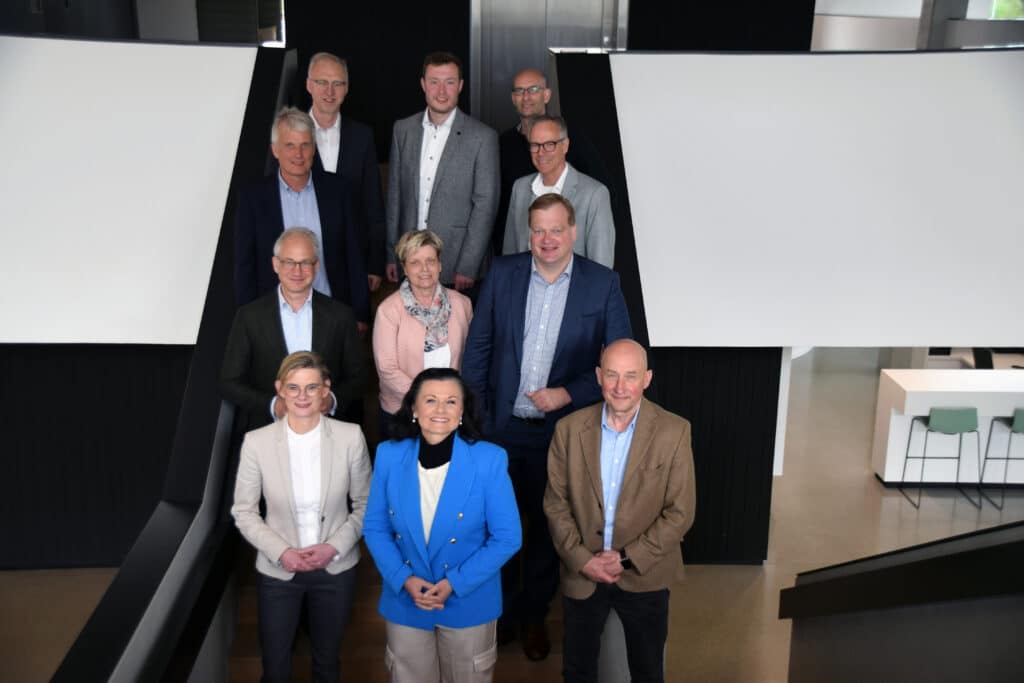Feasibility sets the pace
Politics and science discuss at Klasmann-Deilmann
Klasmann-Deilmann welcomed high ranking visitors from the worlds of politics and science. At the invitation of CDU Member of Parliament Gitta Connemann, the managing director of the German “Agency for Renewable Ressources” (Fachagentur Nachwachsende Rohstoffe – FNR) made his way to the Emsland region. The use of renewable raw materials in growing media was the focus of the talks. However, the potential of the substrate sector for the rewetting of peatlands throughout Lower Saxony was also discussed. The participants agreed that the dialog between the political authorities and the substrate industry should be intensified.
Growing media make a significant contribution to the growth of plants in greenhouses and outdoors. They are particularly important in the cultivation of vegetables, lettuce, fruit and herbs, and in tree seedlings for reforestation projects, because they support the secure supply of healthy food and lay the foundations for healthy forests. Nowadays, substrates that used to be made entirely from peat contain increasing amounts of wood fiber, green compost, coco and other raw materials. On behalf of the German government, the FNR is advancing the development of using as many renewable raw materials as possible in substrates. What is disputed is where the limits lie in the use of wood, compost and other constituents and how quickly the transition process should progress.
Against this background, representatives of FNR, politics and specialist institutes met at Klasmann-Deilmann to discuss the key points of further cooperation. Dr. Andreas Schütte, Dr. Norbert Schmitz, Managing Director of Meo Carbon Solutions, as well as Dr. Marie-Luise Rottmann-Meyer and Dr. Colja Beyer from the 3N Competence Center attended the meeting. In addition to Gitta Connemann, Albert Stegemann, Member of the German Parliament, Lara Evers, Member of the Lower Saxony’s Parliament, and Helmut Höke, Mayor of Geeste, were guests from the world of politics. On the part of Klasmann-Deilmann, Managing Director Moritz Böcking as well as Bert von Seggern and Bernd Dreyer led the talks.
Moritz Böcking pointed out that Klasmann-Deilmann invests large sums in securing raw materials. “Renewable raw materials are an integral part of our substrate mixtures. To meet the growing global demand, we are now even investing in Australia. The secure availability of raw materials remains a key challenge that must also be reflected in the German government’s targets. Feasibility sets the pace.“
Also in view of the past Corona pandemic and the current geopolitical changes, Europe must focus on domestic raw material availability and prevent additional dependencies from arising due to raw material imports.
Gitta Connemann was impressed: “From Emsland to the world. Trends have been born in Geeste for over 100 years. Adapted to the needs of the time. This is only possible with strong local research and development. Medium-sized business as it is written in the book.“
“Our region has been making giant strides in the development of peat substitute products and substrates for horticulture for many years,” Albert Stegemann emphasized. “We as Christian Democrats call for cooperative approaches by politicians with growers and the business community to further this development. At the same time, we must enable affected owners and land users to adopt new profitable business models in the event of impending restrictions on use due to rewetting. This requires more freedom for the generation of solar power as well as market incentives for the cultivation of paludiculture. I strongly agree with Mr. Böcking: feasibility sets the pace.“
Moritz Böcking added that the substrate industry has decades of experience with rewetting peat soils and can support implementation on agricultural land with machinery and personnel.
Dr. Andreas Schütte reminded the audience that the German Federal Ministry of Food and Agriculture (BMEL) “has described essential cornerstones of the transformation of the affected industries in the peat mitigation strategy from 2022. The FNR supports the BMEL in their implementation.“
As there is a need for further talks on all sides, the good contacts are now to be used more intensively.

Visiting Klasmann-Deilmann: Helmut Höke, Bernd Dreyer, Colja Beyer, Dr. Norbert Schmitz, Bert von Seggern, Moritz Böcking, Dr. Marie-Luise Rottmann-Meyer, Albert Stegemann, Lara Evers, Gitta Connemann, Dr. Andreas Schütte.